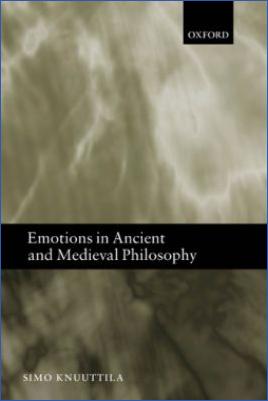
| Emotions in Ancient and Medieval Philosophy | |
| History | |
| PDF Book | |
| 352 | |
| 3.13 Mb(s) | |
|
|
| October 8, 2023 | |
| English | |
| Read PDF Book Online | |
| Click to Download the PDF |
Emotions in Ancient and Medieval Philosophy
“Emotions in Ancient and Medieval Philosophy” by Simo Knuuttila is a comprehensive exploration of the concept of emotions in the philosophical traditions of ancient Greece and medieval Europe. The book examines the various theories of emotions put forth by prominent philosophers of these eras, including Aristotle, Plato, the Stoics, the Epicureans, Augustine, and Aquinas.
The book begins with an overview of the ancient Greek understanding of emotions, which was largely based on the idea that emotions are physiological responses to external stimuli. Aristotle’s theory of emotions is then explored in detail, which posits that emotions are a combination of physiological responses and cognitive evaluations of the situation at hand.
The Stoics and the Epicureans had differing views on emotions, with the former advocating for the suppression of emotions and the latter arguing that emotions are a natural and necessary part of life. The book explores the nuances of these opposing views and their implications for understanding the role of emotions in human life.
Moving on to medieval philosophy, the book examines the work of Augustine and Aquinas, two of the most influential thinkers of the era. Augustine’s theory of emotions is rooted in his Christian faith, which sees emotions as a product of the Fall and a source of sin. Aquinas, on the other hand, sees emotions as a natural part of human psychology and argues that they can be used for good or evil depending on how they are directed.
Throughout the book, Knuuttila offers insightful analysis and commentary on each philosopher’s theory of emotions, highlighting their strengths and weaknesses and placing them within their historical and cultural contexts. He also explores the ways in which these theories have influenced later philosophical and scientific thought on emotions.
Overall, “Emotions in Ancient and Medieval Philosophy” is a thought-provoking and illuminating work that sheds light on the rich and complex history of philosophical thought on emotions. It is a must-read for anyone interested in the intersection of philosophy and psychology, as well as the history of ideas more broadly..
Digital screenshot from the PDF Book
To learn more about the book titled: Emotions in Ancient and Medieval Philosophy, Click the download button below to get it for free
